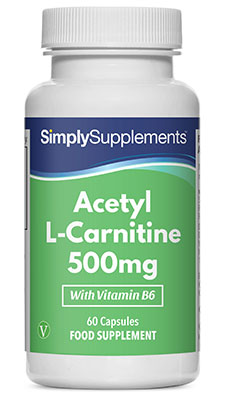Health Benefits of Acetyl L-Carnitine

L-carnitine is an amino acid that occurs naturally in animal products, with the highest levels found in red meat. There are also small amounts found in white meat, fish, milk, avocados and asparagus. The body can make carnitine from lysine and methionine which are two of the essential amino acids, however this process only equates to small amounts.
 Research suggests that the average man only ingests just over a milligram of carnitine per day, which is much less than what has been shown to have beneficial effects in scientific investigations. Because of this, many choose to supplement with carnitine products to achieve the relatively high doses seen in these trials.
Research suggests that the average man only ingests just over a milligram of carnitine per day, which is much less than what has been shown to have beneficial effects in scientific investigations. Because of this, many choose to supplement with carnitine products to achieve the relatively high doses seen in these trials.
Please carry on reading to find out all about carnitine and its wide range of scientifically shown benefits.
What Are the Benefits of Acetyl L-Carnitine?
L-carnitine is a heavily researched amino acid and has a wide range of benefits:
Cognitive Function
L-carnitine supplementation has consistently shown to positively impact cognitive function, especially in older adults. Numerous robust scientific investigations have suggested that provision of this amino acid can improve mood, alertness, general cognitive ability and combat mental fatigue.
These improvements could be due to numerous reasons. Firstly, l-carnitine supplementation in the acetyl form has the ability to cross the blood-brain barrier. This allows the amino acid to positively influence mitochondrial capacity and neuron activity in the brain. L-carnitine could also increase blood flow to the brain due to elevated nitrate levels, which covert to nitric oxide when oxygen availability is low.
This increased blood flow will provide the brain with oxygen and nutrients needed for normal cognitive function.
Body Composition
L-carnitine is also popularly taken for improving body composition (increasing muscle and/or losing fat). Although there is a lack of research in young adults, investigations that have recruited older individuals have shown that l-carnitine can result in an increase in muscle mass and/or a loss of fat.
These results do not seem to be due to specific effects of l-carnitine on muscle building or fat metabolism per se, but seem to be due to the supplement increasing energy levels, leading to individuals being able to exercise harder.
L-carnitine supplementation only leads to an increase in fat burning if the person is deficient in this amino acid. This is most likely to occur in people who eat plant based diets.
Physical Performance
As mentioned above, the improvements in body composition appear to be due to increased energy levels, which positively influences exercise capacity. Aside from exercise, l-carnitine supplementation can also notably improve the symptoms of intermittent claudication. This condition is caused by reduced blood flow to the leg, which can decrease mobility, physical performance and life quality. It is thought that l-carnitine improves symptoms of this condition by increasing blood nitrate levels which helps blood flow to areas where oxygen availability is low.
Blood Glucose Control
Multiple scientific investigations have suggested that l-carnitine supplementation improves blood glucose control. This is thought to be due to the supplement improving the function of the pancreatic beta cells which in turn improves insulin sensitivity. The improvements to blood glucose could also be due to the enhancement of exercise performance, as exercise is known to be potent for improving blood sugar regulation.
Sexual & Reproductive Performance
It has been demonstrated consistently that L-carnitine supplementation can lead to notable improvements in sperm quality in young males. These high quality studies also showed that the improvements were more impressive in individuals who had the lowest quality of sperm. The reason for this enhancement seems to be due to an improvement in the microenvironment of where the sperm matures and is released.
Aside from this, there is some evidence that l-carnitine can help increase erectile function. Again, this is likely due to an improved blood flow due to a higher nitrate concentration.
What Is the Difference Between L-Carnitine and Acetyl L-Carnitine?
L-carnitine and acetyl l-carnitine are different forms of the same compound. Acetyl l-carnitine is more effective for improving cognitive and neurological function as the acetyl group allows the compound to cross the blood-brain barrier with a lot greater efficiency than l-carnitine alone. However, l-carnitine is more effective at improving physical performance as there is a greater amount available to the muscle cells as there is a lower amount supporting the brain.
Can Supplementing with L-Carnitine Help Alzheimer’s Disease?
Although many people take carnitine supplements to help maintain cognitive performance with advancing age, an increasing number of people are taking them to help improve symptoms associated with Alzheimer’s disease. But is there any evidence behind doing this?
Well-designed scientific investigations seem to suggest so.
 As far back as 1990, it was found that over the course of 6 months, supplementing with 1g of acetyl l-carnitine twice daily led to an improvement of tasks that were related to the functioning of short-term memory. However, this investigation received some criticism as the study only contained 20 people.
As far back as 1990, it was found that over the course of 6 months, supplementing with 1g of acetyl l-carnitine twice daily led to an improvement of tasks that were related to the functioning of short-term memory. However, this investigation received some criticism as the study only contained 20 people.
A year later, a study that recruited 130 patients that had been clinically diagnosed with Alzheimer’s disease found that yearlong treatment with acetyl l-carnitine reduced the deterioration of cognitive ability in 13 out of 14 measurements, with 6 of these being classed as significant. Importantly, any of the adverse events that were reported by patients were mild and no more prevalent or serious when compared to the group that received a placebo.
Another study that was conducted around the same time confirmed the results of the above studies. It was found that Alzheimer’s patients that were randomly assigned to the acetyl l-carnitine group (ingesting 2.5-3g daily) again had a slower rate of deterioration in a range of neuropsychological parameters.
These results, although impressive, have not been enough for acetyl l-carnitine to be classed as a stand-alone treatment for conditions that fall under the umbrella of dementia. Saying that, l-carnitine supplementation certainly has a place alongside other prescription medication to help slow cognitive decline.
How Much Acetyl L-Carnitine Should I Take?
Acetyl l-carnitine is popularly taken over a range of doses, but most people find benefits when taking between 500-2500mg per day. It is recommended that acetyl l-carnitine is taken first thing in the morning on an empty stomach so that the compound is rapidly digested to help activate the brain from the get-go.
Many people also choose to take Alpha Lipoic Acid (ALA) alongside acetyl l-carnitine. This antioxidant is a fatty acid which is found within the mitochondria of cells. It has a similar role to carnitine as it helps with energy metabolism and also protects cells from oxidative stress. So when taken alongside carnitine, ALA provides the body with all-round cellular support.
Are There Side Effects of L-Carnitine Supplementation?
Research has shown that in healthy men, 3 weeks of carnitine supplementation at a dosage of 3000mg per day led to no changes in any enzyme or blood parameters. This indicates that oral carnitine provision is a safe choice of supplementation. However, some people have complained of diarrhoea, nausea, gastrointestinal pain, vomiting, headaches, and trouble sleeping.
There is also some evidence that carnitine supplementation may affect the regulation of the thyroid hormones. Resultantly, this product is not recommended for people who suffer from hypothyroidism (an underactive thyroid).
Similarly, there have been reports that carnitine supplementation can increase the frequency or severity of seizures in individuals who suffer from them. Naturally then, it is not recommended that people who have a history of seizures try supplementing with carnitine.
Currently, there is a lack of scientific evidence regarding the safety of use for children and pregnant women. As a result, supplementation with carnitine products is not recommended for these groups.
In summary
- L-carnitine is an amino acid that is found in small amounts in foods such as meat, fish, milk, avocados and asparagus.
- The body can make l-carnitine through the essential amino acids lysine and methionine but this process only yields small amounts.
- As a result, supplementation is the only way to achieve the relatively high levels that have shown positive outcomes in clinical trials.
- Acetyl l-carnitine is the same as l-carnitine, but with an acetyl group which allows the compound to cross the blood-brain barrier more effectively. This allows the supplement to exert its neurological benefits which include reducing mental fatigue and improving mood levels and alertness.
- Because of acetyl l-carnitine’s positive influence on cognitive function it is often taken to improve symptoms of dementia, specifically Alzheimer’s disease. Clinical trials have shown that 2000-3000mg daily is effective at reducing the rate of cognitive decline measured by a range of parameters. Due to these findings, acetyl l-carnitine could work well in synergy with other dementia medication.
- Aside from its ability to impact neurological function, carnitine supplementation has also been shown to improve body composition, exercise performance, symptoms of intermittent claudication, blood sugar control and sperm quality.
- Some people see benefits from taking 500mg per day, but most of the benefits are seen ~2500mg. Acetyl l-carnitine is popularly taken alongside alpha lipoic acid due to having similar roles.
- Side effects of carnitine supplementation are infrequent and usually mild. However, carnitine products are not recommended for individuals with thyroid issues or a history of seizures. This supplement is also not recommended for pregnant women or children as there is a lack of evidence regarding its safety.
Shop for Acetyl L-Carnitine supplements here

Sources:
https://www.ncbi.nlm.nih.gov/pubmed/16169400
https://www.ncbi.nlm.nih.gov/pubmed/15193480
https://www.ncbi.nlm.nih.gov/pubmed/12568837
https://www.ncbi.nlm.nih.gov/pubmed/9070558
https://www.ncbi.nlm.nih.gov/pubmed/11382369
https://www.ncbi.nlm.nih.gov/pubmed/19620516
https://www.ncbi.nlm.nih.gov/pubmed/20963457
https://www.ncbi.nlm.nih.gov/pubmed/12875611
https://www.ncbi.nlm.nih.gov/pubmed/18065594
https://www.ncbi.nlm.nih.gov/pubmed/15039515
https://www.ncbi.nlm.nih.gov/pubmed/18993165
https://www.ncbi.nlm.nih.gov/pubmed/19490608
https://www.ncbi.nlm.nih.gov/pubmed/1444880
https://www.ncbi.nlm.nih.gov/pubmed/2178869
https://www.ncbi.nlm.nih.gov/pubmed/1944900

 Nicole
Nicole 


























